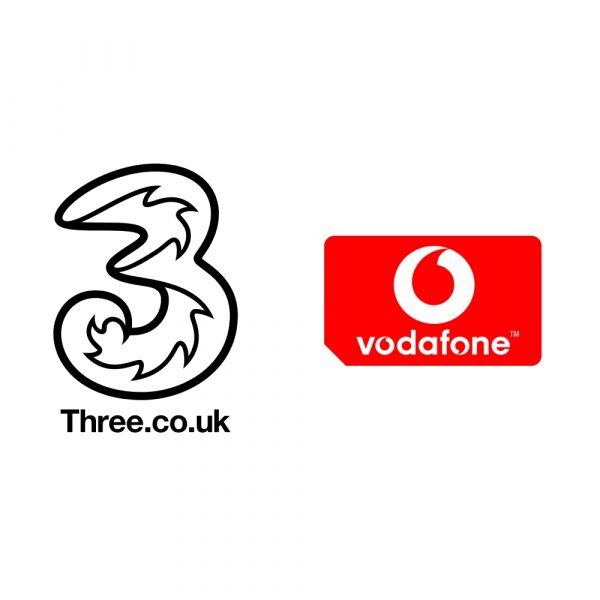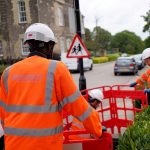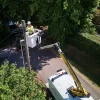Vodafone and Three UK Sign Agreement for Mobile Mega Merger

Mobile network operators Vodafone and Three UK (CK Hutchison) have today confirmed that they’ve reached a formal merger agreement, which is said to be worth an estimated £15bn and will see the former party owning a 51% slice of the business (CKH will hold 49%). But they’ll still have to satisfy the regulators, and that may require concessions.
The operators officially confirmed they were in “discussions” to potentially create Britain’s biggest mobile network operator (MNO) last October 2022 (here). But progress since then has been slow, and that’s most likely a reflection of the complexities involved, not least with respect to how they might approach the regulators.
The deal, if approved by regulators, would enable the pair to more easily invest in accelerated 5G and future 6G mobile (mobile broadband) deployments. On top of that, it would also help them to compete with the already merged pairs of BT and EE, as well as Virgin Media and O2. Not to mention the usual cost savings through efficiencies etc. But neither side has a significant fixed line broadband network of their own, unlike in the BT and Virgin deals, which may still leave them at a disadvantage on that side of connectivity.
Advertisement
However, Ofcom and the Competition and Markets Authority (CMA) have historically tended to dislike big mobile-only mergers due, in part, to a concern that reducing the number of primary mobile operators might result in higher prices for consumers and damage competition at the wholesale (MVNO) level. Not to mention concerns around the merged pair holding too much spectrum in key bands, which could afford them an unfair advantage.
On the issue of pricing. Three UK and its related MVNOs (e.g. Smarty, iD Mobile) have historically tended to be more orientated around being the market’s low-cost brands, while Vodafone tends to be a bit more premium. Vodafone did try to balance this a bit via their own MVNO brand, VOXI, but Three and its providers often still work out cheaper.
Nevertheless, in recent years both the government and regulators appear to have softened their stance, which is partly due to a 2020 ruling by the European Court of Justice (here) – this found that having only 3 operators still made for a competitive market. But such a large merger may still need to make concessions in order to fend off against regulatory concerns, and we’re still reading the release, so don’t yet know all the details.
Headline Details of the Merger
Great for Customers
· From day one, millions of customers of Vodafone UK and Three UK will enjoy a better network experience with greater coverage and reliability at no extra cost, including through certain flexible, contract-free offers with no annual price increases, and social tariffs.
· MergeCo will reach more than 99% of the UK population with our 5G standalone network, delivering to customers up to a six-fold increase in average data speeds by 2034.
Great for Country
· The combined business will invest £11 billion in the UK over ten years to create one of Europe’s most advanced standalone 5G networks, in full support of UK Government targets.
· By having a best-in-class 5G network in place sooner, the merger will deliver up to £5 billion per year in economic benefit by 2030, create jobs and support digital transformation of the UK’s businesses. Every school and hospital in the UK will have access to standalone 5G by 2030.
Great for Competition
· The merger will create a third operator with scale, levelling the competitive playing field, increasing competition to the UK’s two leading converged operators and will also provide more choice in wholesale partners for the UK’s already competitive MVNOs.
· The combined business will offer fixed wireless access (mobile home broadband) to 82% of households by 2030, complementing MergeCo’s access to the UK’s biggest full fibre footprint.
Value-creating Transaction
· No cash consideration to be paid, with the Vodafone UK and Three UK businesses contributed with differential debt amounts at completion to achieve MergeCo ownership of 51:49 between Vodafone and CKHGT.
· Comprehensive joint governance framework in place between Vodafone and CKHGT, with Vodafone fully consolidating MergeCo. Vodafone and CKHGT having call and put options, respectively, which if exercised, would result in Vodafone acquiring CKHGT’s 49% shareholding.
· The Transaction is expected to result in substantial efficiencies. These are expected to amount to more than £700 million of annual cost and capex synergies by the fifth full year post-completion, with an implied NPV of over £7 billion.
· Current Vodafone UK CEO Ahmed Essam will become MergeCo CEO, and current Three UK CFO Darren Purkis will take the role of MergeCo CFO.
· The Transaction is expected to close before the end of 2024, subject to regulatory and shareholder approvals.
Much will now rest on what the CMA will make of all this, and we’ll probably have to wait a few more months to get the answer, but a deeper probe (Phase 2) may be required before that happens. In addition, there’s also a big question mark over whether the Government might raise any security concerns, which stems from the fact that CK Hutchison is a Hong Kong firm and these days that tends to be associated with influence from China.
Advertisement
The government has been trying to avoid scenarios in which countries like China secure key positions in critical national infrastructure, especially telecoms. But CKH may well point out that it already controls some UK ports and power networks, although that doesn’t necessarily improve the perception.
Vodafone and Three UK will also need to consider how they’ll balance this agreement with their existing network sharing arrangements (Three with EE and Vodafone with O2), although this shouldn’t be as much of a challenge as it once was since mobile operators have been increasingly selling off control of their tower / mobile sites to other groups.
Margherita Della Valle, Vodafone Group CEO, said:
“The merger is great for customers, great for the country and great for competition. It’s transformative as it will create a best-in-class – indeed best in Europe – 5G network, offering customers a superior experience.
As a country, the UK will benefit from the creation of a sustainable, strongly competitive third scaled operator – with a clear £11 billion network investment plan – driving growth, employment and innovation. For Vodafone, this transaction is a game changer in our home market. This is a vote of confidence in the UK and its ambitions to be a centre for future technology.”
Canning Fok, Group Co-Managing Director of CK Hutchison, said:
“Today’s announcement is a major milestone for CK Hutchison and for the UK. Three UK and Vodafone UK currently lack the necessary scale on their own to earn their cost of capital. This has long been a challenge for Three UK’s ability to invest and compete.
Together, we will have the scale needed to deliver a best-in-class 5G network for the UK, transforming mobile services for our customers and opening up new opportunities for businesses across the length and breadth of the UK. This will unlock significant value for CK Hutchison and its shareholders, realise material synergies, reduce net financial indebtedness and further strengthen its financial profile.”
However, the Unions have some concerns of their own about this merger.
Gail Cartmail, Executive Head of Operations for Unite, said:
“This deal will give a company with deep ties to the Chinese state an even more prominent place at the heart of the UK’s telecommunications infrastructure. On top of that, it will hike people’s bills and mean job losses for Vodafone and Three workers. The government must step in and stop this reckless merger and Unite is building a cross-party coalition to demand they do so.”
Margherita Della Valle, Vodafone Group Chief Executive, has otherwise described today’s merger of Vodafone UK and Three UK as being “great for customers, great for the country and great for competition.” Only time will tell whether it’s really any of those things, and opinions will vary.
Advertisement
However, the suspicion is that the government and regulators may be more welcoming of this agreement than consumers, since others would argue that it may be better to have three strong providers than two that are dominant and two that are sub-scale.
As to the deal itself. No cash consideration is to be paid, with Vodafone UK and Three UK contributed with differential debt amounts at completion of the Transaction to achieve MergeCo ownership of 51:49. Vodafone UK will be contributed with £4.3 billion and Three UK with £1.7 billion, subject to customary completion adjustments. The initial total debt in MergeCo is expected to be approximately £6.0 billion, of which the £1.7 billion amount owing to CKHGT will be refinanced.
The announcement also includes an extended summary of the deal, which we’ve pasted in full below.
Great for Customers
From day one ⫶ Transform customer experience
· Better network: An improved network performance is expected from day one1. Customers will benefit from improved network speeds and reduction in network congestion. Customers of Vodafone UK and Three UK will also benefit from an increase in coverage, exceeding the Government’s 2027 targets.
· Better value: There will be no change to each operator’s pricing strategy as a result of the Transaction. Customers will pay the same for more, driven by the significantly improved network. MergeCo will remain fully committed to supporting vulnerable customers by continuing to offer social tariffs for mobile and broadband, protected from inflation, as well as flexible, contract-free offers with no annual price increases. Both companies will continue to support vulnerable customers and programmes that focus on skills and digital inclusion to help almost 6 million people.
· More choice in home broadband: MergeCo will have the UK’s widest availability of connections with over 100Mbps speeds through full fibre broadband combined with fixed wireless access (“FWA”).
In the future ⫶ Best-in-class network – increased capacity, coverage and speed, with greater reliability
· Capacity: By combining our networks, network capacity in the future will almost double compared to the two companies on a standalone basis6.
· Coverage: MergeCo expects to reach over 99% UK population coverage with a 5G standalone network by 2034. This is wholly aligned with the UK government’s Wireless Infrastructure Strategy, which sets ambitions for 5G in all populated areas by 2030. This will ensure rural communities across all four nations are not left behind.
· Speed: An up-to six-fold increase in average data speeds for customers by 2034 (compared to each standalone company today) is expected to be achieved enabling customers to reach multi-gigabit speeds.
· Reliability: Due to the improved coverage, speed and capacity of the network, the combined business will be able to provide customers with a better quality, more reliable experience.
Great for Country
· Turbocharge growth, employment and digital innovation: Through the new combined business, MergeCo will deploy one of Europe’s most comprehensive and advanced standalone 5G networks, powering the UK’s digital economy and underpinning the UK’s role as a digital tech leader in Europe. By having a better 5G network in place sooner, MergeCo is expected to deliver up to £5 billion per year in UK economic benefit by 2030, supporting the digital transformation for schools, hospitals and businesses. MergeCo’s standalone 5G network will cover every school and hospital in the UK by 2030, helping deliver the Government’s stretch ambition as set out in the Wireless Infrastructure Strategy9.
· Investment: MergeCo intends to invest over £6 billion in the first five years, and £11 billion over a ten-year plan3, to create a best-in-class 5G network. This level of infrastructure investment would be expected to support between 8,000 and 12,000 new jobs in the wider economy11.
· Accelerating the transition to net zero12: MergeCo will achieve this whilst also reducing energy consumption by accelerating the installation of energy efficient 5G equipment and replacing less power-efficient 2G and 3G systems.
Great for Competition
· More competition and greater network investment: The merger will level the competitive playing field, increasing competition to the two largest converged operators. The merger will create a third mobile operator with scale, competing across all technologies and driving network investment by all players.
Vodafone UK and Three UK are currently sub-scale, with only c.20% and c.10% share of the mobile market by subscriber, respectively. This makes both companies unable to recover their cost of capital (as Ofcom found in its future approach to mobile markets and spectrum review – both companies have Return on Capital Employed of 1-2%) and limits their ability to continue to invest. After completion, MergeCo will have the necessary scale and a great platform to invest, grow and compete.
· More retail competition: We will be better able to compete for all customers driving further network, retail mobile and fixed broadband competition in the UK, including the ability to make converged offers in competition with the two largest operators BT EE and Virgin Media O2. The continuing network sharing agreement with Virgin Media O2 means that its customers will also enjoy network improvements from this transaction, providing an additional boost to competition in relation to market leader BT EE.
· More wholesale competition: With the scale and better quality provided by MergeCo’s combined network, the UK’s MVNOs will gain better choice for wholesale partnerships, keeping fierce price competition at the retail level. MVNOs are the fastest growing part and a major competitive force in the retail market representing around 16.5% of mobile subscribers. Approximately 90% of MVNO customers are currently on BT EE or Virgin Media-O2 networks15.
Mark is a professional technology writer, IT consultant and computer engineer from Dorset (England), he also founded ISPreview in 1999 and enjoys analysing the latest telecoms and broadband developments. Find me on X (Twitter), Mastodon, Facebook, BlueSky, Threads.net and Linkedin.
« Zzoomm FTTP Broadband Goes Live in Bewdley, Worcestershire






















































Over to the regulators now. I for one hope this gets the green light. 5G is expensive and if this is how we get a really good 5G network in the UK, then let it happen.
I assume national roaming between the two networks would happen quite quickly ??
U’re will be sorry if Vodafone going to ruining your day! This is not good news at all. I for one hope this doesn’t get the green light.
Vodafone is awful, Worse than BT if that is possible, allowing this merger to go though will be a bad idea, but the government will allow it.;
I am with Smarty, which is three, but it looks like I will have to move, but who to I don’t know, as I don’t want to go to EE and O2 signal is a waste of time around here.
Don’t give a monkeys about 5G
I get genuinely unlimited 5G data with Smarty for £15 per month which is excellent value. I am concerned this merger may do way with Smarty altogether or replace it with an inferior / more expensive offering.
The best way to better 5G is for the operators to compete on service and fight each other to be the best 5G thus gaining most customers.
Three providers instead of 4 will reduce competition and reduce service, they have to work less to gain share and service will coalesce as a race to be barely usable.
I hope it passes too, but it won’t be smooth sailing, they’ll have to agree to a lot of obligations and concessions to get that through! I may be able to get a decent 3 signal then, maybe.
Absolutely not. The network will be little different to EE, and it will be at EE prices. This merger is about the mess that Vodafone is in at the moment with severe pressure from investors. They want to get Three’s customers and charge them Vodafone prices, and at the same time getting rid of a major price competitor.
I for one hope this doesn’t get the green light. I don’t believe a word of the sales patter (well, it might be good for shareholders I guess).
Does anyone believe the doublespeak? How does one fewer MNO mean more competition at “scale” when the networks overlap, and more wholesale opportunities for MVNOs? Why do schools and hospitals need 5G when both already have all the fibre connectivity they could ever want?
It’s especially amusing to talk about how it will revitalise the economy and create 3 trillion jobs in one breath, then extolling the “efficiencies” (ie job cuts) in the next. Techbro Rishi may still believe the hype around 5G (he certainly still believes in cryptocurrencies and AI) but for others it has already fallen away.
A significant loss of competition that wasn’t a factor in BT/EE and VM/O2.
As for other mergers, the networks will be consolidated into one single network for both, the point here is to give back fair usage of the spectrum that one MNO in particular hogs in this country on 4G (EE), making physically impossible to have the same quality and performance of someone owning more than half of something limited in nature.
On N78 on the contrary Three will surely have to let go of those huge chunks of 5G premier spectrum.
Of course the rest is bs, that’s just marketing but at least as I said, this merger should reestablish fair competition on network spectrum. Provided Ofcom does something and doesn’t act like with the last mobile merger… I don’t understand how they think closing both eyes and leaving carriers to their games of thrones does actually have a positive impact on fair competition…
Why oppose? They told us this’ll be “great for consumers”. Several times, in fact. I’m sure they’d never lie.
Great. My favourite network, merging with the worst network. What could go wrong?
Guess I can kiss my super fast unlimited 5G goodbye.
It’d frankly be a disaster for customers of both networks. This is all about the trouble Vodafone is in from investors. They have underperformed for years and want to get their hands on Three customers and charge them Vodafone prices, while also taking out a competitor. Three also has a huge slice of 5G spectrum that Vodafone would love. For customers of both networks it would certainly mean price rises on the way.
I for one hope this doesn’t get the green light.
If this goes through, there is the potential to change all three remaining networks for the better. Some of the new company’s spectrum will have to go.
I’d imagine EE would get Three’s 800, O2 would get Vodafone’s 1800 and 2600. While both EE and O2 get the 40Mhz slices of Vodafone and Three’s additional 5G carriers.
Yeah, from what I can see, they have a choice between either:
1) Build two very expensive 5G networks
2) Build one 5G network – have a lower cost/more profitable network
I remember when Orange/T-Mobile merged, shortly afterwards unlimited packages died off including Three’s.
Waaaa?
The only reason I can imagine that happened (if it did) was due to the efforts to sell 4G and having such a limited bandwidth rolled out in those days it would of been to quick to kill 4G with unlimited plans, just like unlimited 3G plans killed 3G.
I don’t see how this can get approved if they refused the Xbox buying of activision blizzard this would be a much more destructive merger
Join in the hullabaloo here….
https://www.ispreview.co.uk/talk/threads/possible-vodafone-three-merger-discussion.38556/
Great for the country by 20304 can’t wait for that year
Oh no please no
Welcome to T̶h̶r̶e̶e̶ Vodafone. Thats what this is, its basically Vodafone taking over/buying out Three.
Yes. There is an article, not sure if it was this one but I read this morning that Vodafone will have the option 3 years after the deal completes to buy the entire company.
Vodafree
They could be forced to create a new fourth network and donate spectrum to it, that has happened elsewhere.
You’re right. In Republic of Ireland when Three bought O2, they had to give up spectrum for a new player to enter the market.
I don’t know if the spectrum was bought. whatever spectrum does get sold, it shouldn’t be allowed to be bought by VMO2 or EE. EE are sat on unused blocks & won’t give it up
That created “Image Communications”, probably has about 100-200k customers max and is a really small (waste of spectrum) that offers 4G LTE home broadband connections exclusively in rural areas
and it doesn’t make any sense to do that, because the fourth entrant is going to have to find a lot more money and resources than for the existing established fourth player to upgrade their existing network and/or they end up being a lower quality option.
which is why the US attempt at doing this (Dish Wireless) is struggling, and that’s despite it being owned by an existing firm (Dish Network – satellite pay TV, imagine Sky building their own mobile network instead of using O2’s).
Three themselves had this struggle back in the day, and it took a long time (and an infrastructure sharing deal with T-Mobile) to become a worthwhile option.
Excellent news. They’ll probably have to sell some spectrum, though, as they’ll have a lot of 5G relative to VMO2 and EE.
4 MNOs always seemed an arbitrary number.
There will be no change to each operator’s pricing strategy as a result of the Transaction.
* Yeah, until a few months to a year down the road/ when Three exits & it becomes solely Vodafone.
It was a similar story over in Oz. Vodafone and Three merged as 50/50 and became Hutchinson Vodafone. I think it eventually became just Vodafone.
I’m with Three and to me they are the best network. I just worry Vodafone will trash on Three.
Reading this some more also this may explain Vodafone’s reluctance to invest in their IP network: they were waiting to get their hands on Three’s.
Vodafone already have a large UK IP Network, far larger than Three’s and probably larger than VMO2’s. Vodafone took over Cable & Wireless Worldwide over 10 years ago and received their entire UK and Worldwide network, including various Subsea Cables and share’s in various Subsea cables around the globe.
They do, but Vodafone is a mixed back of mergers, and acquisitions all just smashed together – their network was always an absolute mess. So unless things have changed very recently, adding capacity to a “better” deployed network and moving to that would likely fix some interesting issues at Vodafone.
Matt, we’re talking about the UK here. When Vodafone took over C&WW, they acquired all their Distribution nodes in UK Major cities, City Centre Fibre rings in the same City Centre locations, the connecting Backbone Fibre network and all of C&WW’s IP infrastructure. The point I was making is that Three needed VOD more than the other way around.
The worldwide network isn’t much use for backhauling mobile masts and exchanges.
I agree, Fibre to mobile masts are an issue for all providers except BT/EE, since all operators will have to pay Openreach for providing Fibre to masts, not covered by their own network, but BT will receive provisioning costs back via Openreach profits. BT has good national coverage as far as Exchanges are concerned and soon national Fibre coverage too; Where the various mobile providers utilise BT Exchanges, then they’ll have to pay for co-location areas and Backhaul services over BT’s network, in the absence of local interconnects, but the likes of Vodafone possibly already have significant co-location facilities for providing broadband to the home. I have no idea how Three backhaul their services, or how many locations they have nationally, but I can’t imagine they have the same coverage as Vodafone.
This is speculation on my part, but it makes sense to me.
Vodafone has pretty much shut down the old C&W acquired networks, whilst the products on them haven’t been decommissioned the networks born from THUS, Energis et al……this started back in 2017 and all customers moved over to the new “modern network”. I believe this all completed when the Demon branding was ceased back in 2019.
So it has invested in its IP network as its all pooled now in terms of the fixed network.
@JM It was definitely not done in 2019 – it’s still ongoing. Though quite a lot has been migrated.
The “modern” network hasn’t had a massive refresh for years. Ex Telecom Engineer is confusing the transmission/fibre network for IP network. Huge numbers of exchanges stuck on 1Gbps backhaul with high congestion, poor topology due to smashing networks together on the cheap leads to sub par routing, lack of resilience causes regular outages.
A massive upgrade of billions is needed to meet modern standards, replacing legacy kit at POP sites to enable 10Gbps+ backhaul, removing a lot of the network rings (lots of POPs are daisy chained over shared backhaul which also causes a load of congestion issues), increasing resiliency and so on.
Additionally, a lot of the transmission equipment is ancient, which causes a lot of faults. While you will always have a bunch of faults at scale, the transmission side is a case of perpetual fire fighting.
So you can have 200/400Gbps per channel DWDM in parts of the network, and a load of STM-16/64 in other parts.
Ex Telecom Engineer: “all operators will have to pay Openreach for providing Fibre to masts, not covered by their own network, but BT will receive provisioning costs back via Openreach profits”
Well, there’s other ways of connecting masts to the network other than through Openreach, operators will choose whatever’s the best balance of cost, commercial and technical.
And BT/EE don’t get their backhaul for free, they’ll still need to charge their customers and pay OR the going rate. The BT group only benefit from the net Openreach margin (at a guess 5%), but before they get that they’d still need to make the cash outlay for any dedicated capacity, so it’s only a paper profit for a good few years.
If OR were caught offering EE mates rates, then that would trigger immediate action by regulators that would cost BT group millions in fines, and could be enough to provoke government to order demerger of BT and OR. No matter how remote you might think that, BT aren’t going to take an existential risk like that for the meagre benefits that might arise.
Aren’t there other players in the mobile network backhaul market besides OpenReach (e.g. Virgin Media)?
The website for their new adventures together…
https://vodafoneandthree.uk/home
Not sure how I feel about this. Three helped drive down the cost of calls and data after it’s launch in 2003 and has kept the other networks on their toes.
Obviously, the T-Mobile & Orange merger created a really fast network in EE but not sure if this will happen and my concerns would be losing the Three brand and the value that it has brought to the UK market.
Even if you don’t like or use Three, it’s has most likely helped you indirectly with costs over the past 20 years.
26m customers combined.
No, it should not go through.
I do love to see the nae sayers not airing any valid reasons or evidence to support their boohoo’s .
Perhaps you need to read through the comments. Plenty of reasons why.
It’s never good for a few companies to dominate the market. This will create one with 26m customers.
*ignores ALL the comments*
I see nobody giving reasons.
lol.
I never said I saw nobody give reason…. RTBC!
Why when Orange and T-Mobile merged it was ok but not for Vodafone and Three…. Why is Virgin Media allowed to have some many customers??
Reality check here is, I witnessed the power of Three networks, it meant great consistent service.
Having 4 networks isn’t going to stop price gouging…. Compentant regulators will but hey we don’t have them either.
I’m personally sick of a country with 1 semi perfect network, 2 networks that differ on things and 1 that is still powered by steam…. So I like the idea of two differing networks coming together to bring challenge to the perfect child.
@JP: When Orange and T-Mobile merged, we went from 5 to 4 networks. Now we’ll have 3. If they can’t say “no” because of the Orange/T-Mobile deal, then where do we stop? 2 networks? Why not just have one network? That’s not a very good excuse to approve this merge, is it?
BT buying EE and Virgin Media and O2 merging are different. It was a broadband + mobile deal and we still had 4 mobile networks. The Vodafone + Three deal is mobile + mobile (Vodafone uses OpenReach for their broadband) and will eliminate the cheapest mobile network in the UK.
If you think that we don’t have competent regulators, then I don’t see how going from 4 to 3 networks and losing Three in the process will make things better. EE won’t reduce their prices, Vodafone will be more expensive because they’re better (post merge), and O2 still act like they’re a premium network.
We’ll have another network like EE (good) and lose the only competitive one (very bad). Better quality no doubt, but we’ll all end paying more in the future.
All reasons given are invalid. Cos I says so.
hubris much?
> 99% of the UK population with our 5G standalone network… by 2034.
That sounds like a long time for just population coverage (not even geographic)? Do we know what the plans are for other networks?
The trade off here is huge. We get a network competitive with EE, but we will also have 3 companies with 25% market share, a serious reduction in competition.
The CMA needs to really scrutinise this.
They will. Over the past five years, CMA took 45 cases through their Phase 2 assessment, which means a detailed investigation. Of the 45, only 9 were cleared unconditionally, 10 were permitted subject to divestment conditions, 4 were permitted subject to behavioural conditions. 10 were prohibited outright, and 12 were abandoned by the parties involved during the course of the investigation – mostly because the parties concluded during the Phase 2 investigation (or when that was announced) that they’d either be blocked or conditions imposed that would make the planned deal less attractive.
So that’s 20% get approved, 49% stopped, and 31% allowed with strings attached.
If I were a betting man, I’d guess that the odds are against the Voda/Three merger being approved, specifically because they’re in the same sector. VM/O2 were primarily merging across broadband and mobile, as were BT/EE. Release of spectrum shouldn’t be much of an argument because that doesn’t create any new competitive offer. The key test is whether a merger would create any “significant lessening of competition”, and to my mind this would – the CMA will have to see if they believe the companies argument that they need the incremental scale to roll out 5G.
Personally I wouldn’t buy that, partly since Three already have a fairly strong 5G presence, but mainly because Vodafone could already have invested a lot more in 5G if they weren’t so obsessed with ignoring the UK business, and wasting executive time and investor cash overpaying on big ticket acquisitions that they then have to write down. Voda’s total “exceptional items” over the past ten years is £6 billion, almost 30% of their pre-tax profits over the same period.
Fantastic news today, long overdue as finally now someone will be able to challenge EE’s market position.
Just a pity it’s going to take until the end of 2024 to finalise though 🙁
il be ditching Three and going to EE now this has happened . Vodafone honestly the worst company ive ever had to deal with in my life and i literally cant face having to deal with them again . EE it is
Yep, almost, Talk Talk is worse and BT is not far off.
My understanding used to be that most of the complaints about TalkTalk related to the customers that they inherited when they acquired Tiscali. However, that was in 2009 and I’m still hearing bad things. TalkTalk was demerged from Carphone Warehouse in 2010 and I don’t know if that led to a lack of investment but it’s amazing that they have survived this long with such a poor record.
One potential problem for customers, of course, is the challenge of changing e-mail address if they move ISP. For some this won’t be a big issue but, as we rely more and more on e-mail and less on postal addresses and landline numbers to communicate with suppliers etc. it becomes a more difficult proposition.
I love Three, they just need good investment in their 4G. I worry that 5 years time, three will be a thing of the past, it will be Vodafone only with higher costs poor customer service and rolling out 6G at the same speed they roll out 5G…
Look at what happened in Australia…
shame its not 51% to three, I would trust it more..
Not a massive fan of Vodafone but they are the best where I live, I have always felt that Three is a junk network provider with horrendous support that I swore never to go back to ever again after how bad it was.
I think that they are big enough as it is and a combined new company will before to big and hold to much sway to set prices that aren’t adventagous for customers or sublet providers.
TBH I thought O2/VM merger as well was a horrendous allowance, mind you VM cant get any worse than they are these days. Only worse combo would be 3/VM LOL
Two things will happen if this goes ahead:
– The new Vodafone network (Vodafone is buying Three) will be capable of competing with EE.
– Prices will increase because O2 doesn’t have the capacity (or incentive) to be very cheap and BT/EE won’t start a race to the bottom.
This will also affect MVNOs. With O2’s network struggling and only 2 other premium networks available, I don’t see why they would sell a lot of data at low prices. At the end of the day, MVNOs depend on MVOs for their offerings.
It’s a shame Three doesn’t control the new company. Vodafone is “stale” almost everywhere they operate in, so we’ll get more of the same. Three at least is competitive.
If the merge is approved, I hope they’re forced to make some spectrum available for a new 4th network, otherwise we’ll be paying a lot more than we do now in a few years.
One of the reasons for this merger is that 3 always struggled a a Johnny-come-lately in the MNO sector. Even now their coverage is the most patchy of all MNOs, offset slightly by the more modern network they have.
If spectrum was released for the new fourth operator, they’d need to build a complete new network that for a ballpark figure would cost about £6bn to be roughly on a par with where 3 are now, and 3 have been at it for twenty years now. There are companies with that sort of money to invest, problem is that it takes years to build a network with high enough coverage to be viable, think six to ten years minimum just to get a basic level of national coverage. The expertise and capability isn’t readily available, all telecoms suppliers are committed to FTTP, altnets and 5G work, labour costs are inflated by the massive amount of building programmes going on across the UK at the moment, and the majority of the best mast sites have already been taken (so nimbyism and unhelpful councils are going to be a major drag). In a world of rising interest rates and inept government policy making, who would be mad enough to try and launch a new MNO, even if they got spectrum for free? Potentially somebody would try, I can’t see it making good business sense.
Competitive fixed infrastructure is always difficult to turn into a viable business, and that’s why altnets are struggling, why VM have never turned a credible profit on broadband. If the other MNO’s didn’t have a thirty year march on a new MNO then things might be different.
However, competition authorities blocked the 2015 merger plan between 3 and O2. Whilst that was EU competition authorities with major input from UK regulators, be interesting to see if the CMA will permit this latest plan. Given the totemic value government attaches to competition I’d be inclined to think probably not, then again with the inept clowns of this government perhaps I’ll be wrong.
@No one
I’m a long suffering Three customer. It may be competitive on price, but the quality is so low that I need an EE SIM just in case I need to make a business call, work on the train or travel abroad. I think the merger makes sense even if it’s a little less competitive on price.
@James:
Every network – even EE – is bad in some areas. For example, O2 is a terrible choice for me because their data is too slow here. My solution? I don’t use them! It’s the “use the best tool for the task” but applied to mobile networks. You probably shouldn’t be using Three.
I agree that Three has problems, but what you’ve described isn’t the norm everywhere. I’ve used Smarty for a few months, including for roaming in the EU, and don’t plan to move. If you look at this site’s forums you’ll see that I’m not the only one happy with Three’s network.
The merger makes sense from a network quality point of view, but it will cost everyone more. Three brings the prices down on O2 and Vodafone. With them gone you’ll have an expensive “premium” EE, a new “premium” and expensive Vodafone, and O2 struggling with their overcapacity network. Prices will go up, more than just a little bit.
Now, wouldn’t it be better if Three performed like EE? Yes it would. But we already have EE for that. You know what we won’t have after the merge? A replacement for Three. And that’s my problem with this merge.
This isn’t a good thing and I hope the CMA put a complete stop to it. Vodafone should be running to the hills, but weirdly are thinking they’re getting something from Three out of this deal. The board members must be getting a HUGE sweetener because other than a load of poorly maintained and invested, pitifully ran Three infrastructure with laughable backhaul, I can’t see for a second why Voda would touch CK Hutchison with a bargepole.
Really, Vodafone, you are better than this.
Is that a “tell me you don’t know about the current state of mobile telephony” post?
3 have one of the largest 5G networks in the country, second only to EE. All connected by multi-gigabit fibre. Vodafone have almost nothing and need not only that RAN but also 3’s frequencies in order to compete. If the merger does not go ahead, there’s a risk that Vodafone could fall behind 3 to last place in UK customer numbers within a decade. Vodafone are actually in a pretty desperate position.
Three has a inventive marketing team more than happy to spew fake news till the cows come home.
Having “the largest 5G networks in the country” is all well and good if it works and delivers what a marketing team say it does and (pretty much like Three’s 4G network) I’ve found from personal experience it is terribly lacking in both coverage and quality of service 5 mile from most major towns (where you’ll not see 5G at all and contention on the network due to lack of backhaul is laughable at best). You don’t see this happen in anywhere the same league with Vodafone.
I’m not suggesting Three doesn’t have issues, but the facts are clear. Three won 100 MHz of 5G bandwidth in the auctions and Vodafone didn’t. Three also has a lager 5G RAN than Vodafone. Three has also been part of MBNL with EE, which is why both networks lead on 5G coverage, where as Vodafone have the issues surrounding Cornerstone and O2 managing the sites of half their current network.
This has nothing to do with marketing or “fake news” (which to be fair could be more accurately said about your post) and everything to do with Vodafone being desperate to gain what Three has, while eliminating them as a competitor.
You can’t make nonsense claims like “Vodafone should be running for the hills”, “board members must be getting a HUGE sweetener” implying corruption, when the business reasons are blindingly clear to anyone paying attention.
Vodafone is a company in serious trouble – there’s a huge amount of investor pressure on them because they’ve underperformed for years. Their chief exec was recently sacked because of it. This merger is primarily motivated by Vodafone’s weakness (they think they can magic away their poor management problems with it and create a market where o2, Vodafone and EE carve things up). As for Three, they have a huge slice of 5G spectrum but have not rolled out the equipment yet to take advantage of it in many places, which is why their network is so inconsistent. Give it several years though and it should be as good as anyone else’s. It would be in Vodafone’s interest to take out Three now, but certainly not in the consumer’s interest.
Contrary to what this article states, the merger would do nothing to help Vodafone and Three compete with EE and o2 – Vodafone’s problems will not be solved by any mergers. Let’s not forget that it really wasn’t all that long ago that Vodafone was the UK’s number one network. They have fallen because of appalling customer service, often poorly priced products and very poor management. Three has advanced a lot in recent years but still sufferers from the reputation it gained from its calamitous start. Their network is outstanding in places, still virtually non existent in others. This merger is essentially Vodafone seeking to dodge its underlying problems by getting hold of Three and charging its customer’s Vodafone prices. There would be little incentive for o2 or EE to engage in a price war when they are similarly priced to Vodafone already. The merger would result in Vodafone, EE and o2 having cosy market domination and the rest of us paying the price.
@Munehaus I think we need to make a careful distinction here. Three have a very large slice of 5G spectrum. But they have not yet rolled out the equipment to take advantage of it in many areas. That’s why their network is indeed incredibly good in some areas, virtually non existent in a lot of others. Give it a number of years and it should be great, but it certainly isn’t like that in many places at the moment. With regard to Vodafone, they’re a company in trouble. There’s a huge amount of investor pressure on them because they’ve underperformed for years. I think we agree that this merger is primarily motivated by Vodafone’s weakness and wanting to take out a competitor. I can’t see any good coming out of it.
I’ve gave three 5 years where I live to improve. Even tried their home broadband using its 4G (because 5g still isn’t available) it proved fruitless due to such high numbers of subscribers making the service useless every evening (sub 1Mbps). I tried it again 5 years later and if anything coverage and download speeds had got even worse. Three could have 90% of the spectrum and it wouldn’t make a bit of difference if they don’t have the infrastructure AND provide the high back-haul requirements to support it.
They didn’t for 4g and are not improving it, and they won’t for their “pretend” 5g roll out either. Its all smoke and mirrors IMHO. Merging with Voda will not improve Vodafones management problems either, it’ll just make them even worse.
This is all the UK needs more monopolies, this is why nothing changes here and when it does it takes years.
Slow broadband with few options, 3 phone networks, EE/Vodaphone and Three soon to be 2 networks.. how is this a good thing?